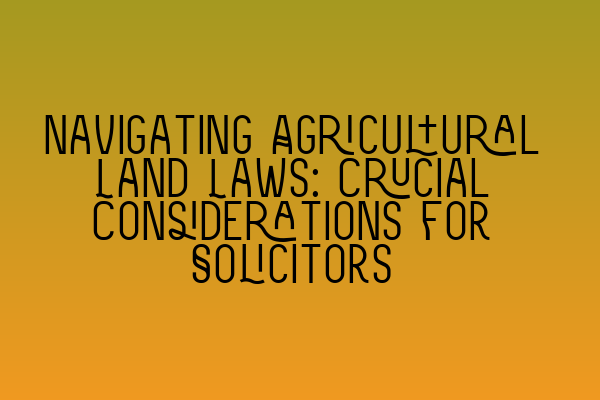Navigating Agricultural Land Laws: Crucial Considerations for Solicitors
Introduction
As a solicitor specializing in property law and land law, it is essential to have a comprehensive understanding of the laws governing agricultural land. Agricultural land provides a unique set of challenges and considerations that require specialized knowledge and expertise. In this blog post, we will explore the crucial aspects of agricultural land laws that solicitors should be familiar with, ensuring they can effectively advise their clients while adhering to legal requirements.
Understanding Agricultural Holdings and Tenancies
Agricultural holdings and tenancies form the foundation of agriculture-related legal matters. It is vital to have a firm grasp of the various types of agricultural tenancies, such as farm business tenancies and agricultural holdings under the Agricultural Holdings Act 1986. These tenancies often involve complex negotiations, rent determinations, and succession rights. By familiarizing themselves with the intricacies of agricultural tenancies, solicitors can provide accurate and strategic advice to their clients.
Navigating Farm Business Tenancies
Farm business tenancies (FBTs) are regulated by the Agricultural tenancies Act 1995 and can be volatile for both landlords and tenants. Solicitors must understand the key provisions of FBTs, including the determination and alteration of rent, repairs and maintenance obligations, and the statutory succession provisions. By staying up-to-date with any amendments or changes in legislation, solicitors can ensure their clients are aware of their rights and responsibilities as either landlords or tenants.
Environmental Considerations
Agricultural land and the surrounding environment are closely intertwined. Solicitors need to have a comprehensive understanding of the environmental regulations that impact agricultural practices. These regulations often include measures to protect natural habitats, manage water resources, and conserve biodiversity. By advising clients on the relevant environmental considerations, solicitors can help them make informed decisions that align with sustainable and environmentally responsible farming practices.
Common Agricultural Policy (CAP) Subsidies and Grants
The Common Agricultural Policy (CAP) subsidies and grants play a crucial role in supporting farming activities throughout the UK. Solicitors should be familiar with the application process, eligibility criteria, and any legal requirements associated with these incentives. By guiding their clients through the application process and ensuring compliance with CAP regulations, solicitors can help secure vital financial support for their agricultural clients.
Planning and Development Potential
Agricultural land often presents opportunities for planning and development, which can significantly impact its value. Solicitors should have a thorough understanding of the planning permission process, including any restrictions or conditions specific to agricultural land. By providing expert advice on potential development options, solicitors can assist clients in making informed decisions that maximize the value of their agricultural holdings.
Inheritance and Succession Planning
Succession planning is a critical consideration for landowners, ensuring their agricultural assets are passed down effectively while mitigating any potential disputes. Solicitors should be well-versed in the legal aspects of inheritance and succession planning, including the preparation of wills and trusts, tax implications, and family land disputes. By offering comprehensive estate planning services, solicitors can provide their agricultural clients with peace of mind and a clear roadmap for the future.
Conclusion
Navigating agricultural land laws requires a deep understanding of the unique challenges and considerations involved in managing agricultural holdings. By staying up-to-date with current legislation and industry developments, solicitors can provide invaluable advice to their agricultural clients. From understanding agricultural tenancies and environmental regulations to guiding clients through the planning permission process and assisting with succession planning, solicitors specializing in agricultural land can help their clients make the most of their assets while complying with legal requirements.
Related Articles:
– 22. Balancing Work and SQE Prep: Strategies for Success
– 24. Unlocking the Secrets to Passing the SQE Exam
– 23. Understanding the Grading System in SQE
– 24. Unlocking Knowledge with SQE Webinars: Expert Insights at Your Fingertips
– 17. Review of SQE Course Providers: Choosing the Best Fit
